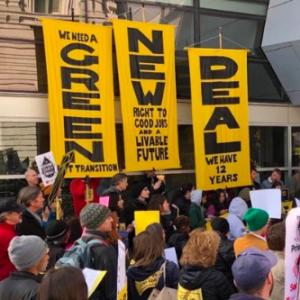When she pitched her slate of environmental reforms as “the Green New Deal,” freshman Democratic Rep. Alexandria Ocasio-Cortez was betting that Americans shared her positive associations of the first New Deal. According to its defenders, Franklin D. Roosevelt’s policies of economic regulation and massive public works projects helped to bring the U.S. out of the Great Depression. More recently, economic historians have been challenging this view, pointing out ways in which the New Deal helped to prolong, rather than end, the Great Depression.
Some economists believe the Green New Deal shares many of the flaws of its namesake. “In essence, the New Deal was designed to help businesses and workers by restricting competition on the production side,” Robert Murphy, an economist whose work focuses on the social cost of carbon, told InsideSources. “By preventing what they called cutthroat competition [through] product and industry codes saying that you could only work certain hours…. I think the unifying element was restricting output in order to raise the prices of products and services.”
Murphy believes that the Green New Deal proposal released by Ocasio-Cortez would similarly raise the prices of goods and services. Most likely, this would be a result of increased labor costs due to requirements that workers be offered generous benefits– including healthcare and a guaranteed universal basic income — and the impact of increased regulation.
The debate opens up two very different views of the original New Deal. For decades, consensus held that the New Deal, especially its massive public works projects, helped lift the U.S. out of the Great Depression. This is the opinion of people like CUNY Health Policy and Public Health scholar Lyndon Haviland, who praised the New Deal as “the most successful economic stimulus initiative in American history.”
“FDR took hits from every direction in order to prevail, in the end, with a plan that became the single most important economic development program of modern time,” she wrote in a piece urging Democrats to accept some compromises to achieve their greater goals. “His long-view of the political landscape made its implementation possible. And it’s what’s missing from today’s Green New Deal environment.”
More recently, free market economists have released new scholarship questioning this view of both the Great Depression and the impact of the New Deal. In doing so, they are undercutting the model for massive government intervention in the economy that Ocasio-Cortez chose to model her environmental reforms on.
According to this school, the lasting legacy of the original New Deal was not economic recovery, but the size of government involvement in the economy through price controls and regulations. These economists fear that, in this regard, a Green New Deal would resemble its predecessor by providing an opening for carbon regulation that will hamper the economy, most likely through increased energy costs.
“Some of the objectives of the Green New Deal are so ludicrous, like going carbon-free in 12 years, that some people think we don’t need to worry about it,” Murphy said. “My concern is that they will put that [goal] out as a marker and when the actual legislation that goes through they will say ‘We need to decarbonize at such and such rate,’ but still, if it is forcing utilities to provide electricity in a way they otherwise wouldn’t that must mean that it is more expensive.”
The impact of this sort of regulation can already be seen north of the border. For the past several years, Canadian small businesses have been complaining that clean energy mandates have left them paying some of the highest electricity rates in North America. Higher prices for inputs like electricity in turn raise prices on finished products for consumers and hamper businesses’ ability to hire and expand.
These prices hikes are all but destined to happen. After all, says Murphy, if clean energy were price competitive, companies would be adopting it on their own.
“I’m worried that the actual practical, realistic targets or mandates won’t be as aggressive as some of the rhetoric that is floating around now, but will still make electricity and gas more expensive than they need to be,” he said.
“People who are low income–they are going to have their electricity be more expensive, their housing be more expensive, their gasoline be more expensive because of this program.”
This, like the regulations inherent in the original New Deal, would hurt long term economic growth. Despite the positive associations many Americans have with the New Deal, economists are coming to believe that its onerous regulations lengthened the Depression, rather than alleviated it.
Currently, the U.S. has been in one of its longest ever recoveries, but no economist would bet that such growth can continue forever. In the event of an economic downturn, environmental regulation is not likely to help pull the U.S. back into growth.

